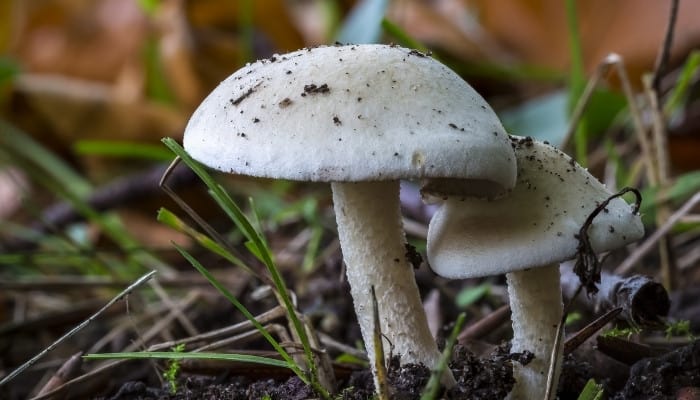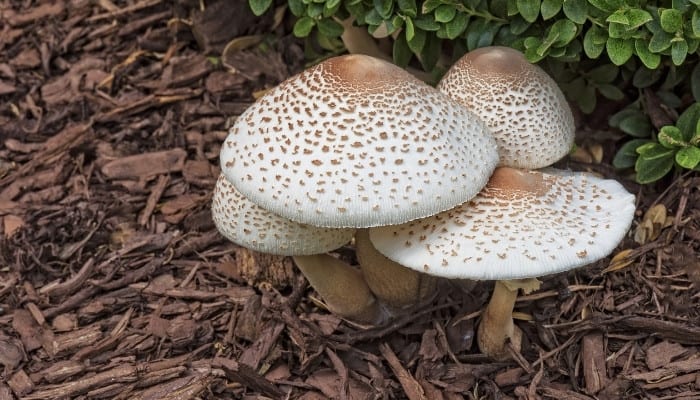Mushrooms are a familiar sight in gardens, as they are known to flourish in the specific environments that gardens provide.
Most mushrooms growing in the garden are seen as harmless, but that may not always actually be the case.
Are mushrooms bad for your garden? Mushrooms are good for aiding and accelerating natural processes in that they contribute to the decomposition of organic materials, which is incredibly beneficial. However, some mushrooms in the garden may be toxic, smell horrible, or even be psychedelic.
Read on below to learn more about whether or not mushrooms are bad for your garden, why they’re growing there in the first place, and how to get rid of them.
Garden Mushrooms – Good or Bad?
Generally speaking, mushrooms are far more beneficial to gardens than they are “bad.”
Mushrooms help organics decompose and create nutrients that help plants grow and thrive. They are especially helpful in breaking down wood chips, tree stumps, and leaves.
Some mushrooms from the garden are edible as well, but beware, as some garden mushrooms may be poisonous or psychedelic.
Why Mushrooms Grow in Gardens
When the conditions are just right, mushrooms may pop up almost anywhere in nature. That includes your lawn, flowerbeds, and garden.
Prolonged weather patterns of rain and humidity cause mushrooms to grow in ripe spaces like gardens.
Mushrooms are even more likely to show up in gardens or flowerbeds that have wood chips but will generally grow anywhere that has dirt, grass, or wood and receives some sort of moisture.
Are Mushrooms a Sign of Overwatering?
Mushrooms can be interpreted as a sign of overwatering, but this is not always the case.
Sometimes mushrooms are simply indicators that the soil in your lawn or garden is rich in nutrients.
That said, lots of rain or overwatering (typically with sprinklers or garden hose) can produce just the right environment for mushrooms to grow at accelerated rates.
Types of Mushrooms Commonly Found in Gardens
There are numerous types of mushrooms that may pop up in your garden from time to time. A few of the most commonly found garden mushrooms are listed below.
Edible:
- Common ochre russula (brittlegill)
- Field mushroom
- Giant puffball
- Oyster
- Shaggy ink cap
- Shitake
- Wine cap
Inedible:
- Sulfur tuft
Poisonous:
- Liberty cap
- Fly agaric
- Fairy ring mushroom
- Yellow-staining mushroom
Are Mushrooms a Sign of Good Soil?
Mushrooms are indeed a sign of good soil in your yard, flowerbeds, or garden. They are an indicator that there is plenty of nutrients in your soil.
Furthermore, they are basically fertilizing your lawn as they break down dead organics and transform them into nutrients.
Garden Mushroom Roles & Benefits

Mushrooms in the garden have several important roles that are beneficial to nature. Below, we discuss the most significant ones.
Symbiosis
Mushrooms play a vital role in nature by providing a symbiosis with trees.
In forests and in your backyard the mushrooms growing on trees are actually exchanging crucial nutrients with the tree.
Without the mushrooms, the tree wouldn’t be able to extract specific minerals from soil and water.
Likewise, without the tree the mushroom would struggle to find carbohydrates (sugar compounds).
Saprophytism
Perhaps the most common and beneficial role of garden mushrooms is saprophytism.
That’s when mushrooms help wood, or other organic materials, to decompose quicker than they would otherwise be able to.
Saprophytism is one of the main reasons that garden mushrooms aren’t necessarily a bad thing.
Parasitism
A third role of mushrooms in the garden, and nature in general, is that of parasitism.
That’s when mushrooms act as an actual parasite, infecting a host and living on it. Most hosts are trees or plants.
Sometimes, the parasitism is prolonged for years. However, parasitism can be beneficial in speeding up the death of sick or dying plants, trees, or insects.
Yes, microscopic mushrooms actually grow on insects.
Will Mushrooms Kill Plants?
Despite popular belief, mushrooms aren’t necessarily damaging or even harmful to your plants.
On the contrary, many mushrooms are simply helping create rich organic compost for the plants to feed on.
Are Garden Mushrooms Poisonous?
Out of all known mushrooms, approximately 3% of them are considered poisonous.
Based on those numbers, it is probably true that most garden mushrooms are not poisonous.
Remember, garden mushrooms only make up a small percentage of the overall number of known mushrooms.
How To Get Rid of Mushrooms in Garden

There are several effective ways to get rid of mushrooms in the garden.
Just keep in mind that each mushroom has the ability to drop millions (if not billions) of spores, and some may grow back no matter what you do.
A few of the most successful methods for getting rid of garden mushrooms include:
- Uprooting the mushrooms by the base of their base.
- Control your watering and avoid overwatering.
- Removing dead and dying organic materials in which mushrooms thrive.
- Aerate the areas mushrooms are showing up.
- Literally dig out the entire chunk of earth containing the mushroom and spores.
- Add nitrogen oxide to the soil where the mushrooms grow.
- Apply homemade remedies like vinegar, salt, and baking soda.
When picking mushrooms, carry a baggy to put them in as soon as you pluck them. That way you catch their spores rather than helping to spawn hundreds more mushrooms.
Will Vinegar Kill Mushrooms?
Vinegar is one of the go-to homemade remedies for killing garden mushrooms. That’s because it contains the active ingredient acetic acid.
However, beware when you use vinegar for killing mushrooms in the garden; it can also kill plants and grass.
Does Baking Soda Kill Mushrooms?
Baking soda is another popular home remedy for killing mushrooms in the garden.
It doesn’t work as quickly as other methods, but in the long run, baking soda helps reduce mushroom growth and kills the ones that grow as well.
The best way to use this method is by mixing a gallon of water with 2 tablespoons or so of baking soda.
Shake well before use. For optimal results, you can follow up by sprinkling some fresh baking soda wherever you spray for mushrooms.
Related Questions:
Why Are Mushrooms Growing in My Lawn?
Mushrooms are growing in your lawn for numerous reasons.
Your soil may be rich with nutrients, or there may be organic material that needs to be broken down or recycled into nutrients somewhere in your lawn.
An overwatered lawn may also result in mushroom growth.
How Fast Do Mushrooms Grow?
Mushrooms grow at various rates from species to species. Some mushrooms can actually appear and grow to full size overnight or by midday over the course of only a few hours.
Others take days or weeks to grow to full maturity.
Are Mushrooms Bad for Your Garden?
Most garden mushrooms are actually quite beneficial or entirely harmless. That said, of course, there are a few exceptions.
For the most part, garden mushrooms just pop up long enough to help accelerate the decomposition of organic materials like leaves, wood chips, mulch, and weeds in the garden.

